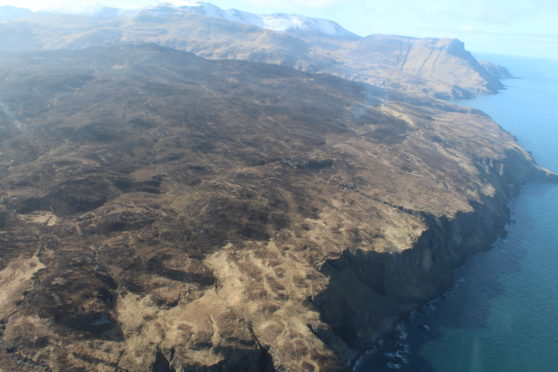A fire sparked by a discarded cigarette has destroyed habitats on a west coast island that will take five to 20 years to recover, environmentalists have revealed.
It will take up to two decades for wildlife habitats on the Isle of Rum to recover after a wildfire last April that devastated an area equivalent to 16 miles, according a Scottish Natural Heritage (SNH) investigation into the incident.
The effect on wildlife, however, was assessed as having a low to medium impact.
In the aftermath of the fire, that began at about 1pm on April 4, 2018, concerns had been raised about the effect it would have on the habitat and animals on the island.
The report found there were mainly low to medium impacts with less than one per cent of a four-mile area suffering any high impacts.
>> Keep up to date with the latest news with The P&J newsletter
Thirty-five percent of the habitat was judged to have suffered low impact, and 58%, medium impact.
SNH was concerned that potential loss of habitat quality since April could affect ground-nesting birds, reptiles, mammals and insects – but so far, signs are promising.
Sea eagles have continued to nest close to the area of the fire, breeding of red-throated divers has been similar to other years, and other birds which are monitored regularly have shown no noticeable changes.
In fact, some birds, such as merlin, had more breeding territories in 2018 than in previous years.
However, the report also found the habitats will take anywhere from five to 20 years to recover.
Although the severity of this fire was low to medium, wildfires like this can still increase the risk of soil erosion, encourage less desirable plant species, dry out naturally wet habitats, and inhibit natural processes such as carbon storage in bogs.
Ian Sargent, SNH’s south Highland reserves manager, said: “It’s good news that the habitat hasn’t been affected severely.
“But this is certainly still a setback for efforts to improve the habitat condition, and there are areas which will take years to fully recover.
“This is also a timely reminder that we’re now moving into a time of year when the risk of fire is often quite high. So we’d urge anyone visiting natural areas or conducting Muirburn to take extra care.”
The fire was started accidentally from a discarded cigarette that had not been entirely extinguished by a visitor to the national nature reserve.
